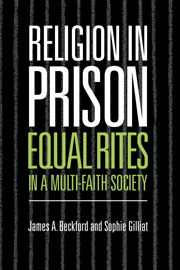Book contents
- Frontmatter
- Contents
- List of figures
- List of tables
- Abbreviations
- Preface
- 1 Equal opportunities and multiculturalism in prisons
- 2 Chaplaincy, chaplains, chapels and other faiths
- 3 Church of England prison chaplains
- 4 Visiting Ministers of other faiths
- 5 ‘Facilitation’ or ‘dependence’?
- 6 Inclusion and exclusion
- 7 Prison chaplaincy in the United States
- 8 Conclusions: state, church and diversity
- Notes
- Appendix
- References
- Index
5 - ‘Facilitation’ or ‘dependence’?
Published online by Cambridge University Press: 22 August 2009
- Frontmatter
- Contents
- List of figures
- List of tables
- Abbreviations
- Preface
- 1 Equal opportunities and multiculturalism in prisons
- 2 Chaplaincy, chaplains, chapels and other faiths
- 3 Church of England prison chaplains
- 4 Visiting Ministers of other faiths
- 5 ‘Facilitation’ or ‘dependence’?
- 6 Inclusion and exclusion
- 7 Prison chaplaincy in the United States
- 8 Conclusions: state, church and diversity
- Notes
- Appendix
- References
- Index
Summary
Equal respect among all faith communities is not a static or abstract matter of values and attitudes. It is an active matter of social relationships and interactions. Having considered the social backgrounds and qualifications of Church of England prison chaplains and of Visiting Ministers we shall now analyse their day-to-day interactions, emphasising that their different positions in the organisational structure of prisons shape the way in which the two sets of chaplaincy workers deal with each other. A socio-logic is at work in chaplaincies, and sociological forces shape the mutual relations between chaplains and Visiting Ministers. Personal opinions, attitudes and dispositions need to be situated in their social context.
We shall begin by analysing the patterns of routine interactions between Church of England chaplains and Visiting Ministers. The interrelationship is more often constructive than destructive, but the sources of both harmony and friction need to be explained. Special attention will be paid in the second section to the imbalance of authority between chaplains and Visiting Ministers as well as to ideas about the future of other faiths’ involvement in prison chaplaincy. The third section will consider Visiting Ministers’ opinions about the role of Anglican chaplains, the organisational structure of chaplaincies and the conditions for improving the religious and pastoral care of prisoners from other faiths. The perceived advantages and disadvantages of the current arrangements for chaplaincy will be considered in the fourth section.
- Type
- Chapter
- Information
- Religion in Prison'Equal Rites' in a Multi-Faith Society, pp. 116 - 141Publisher: Cambridge University PressPrint publication year: 1998



